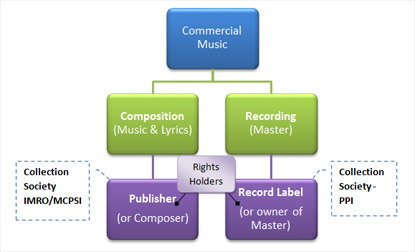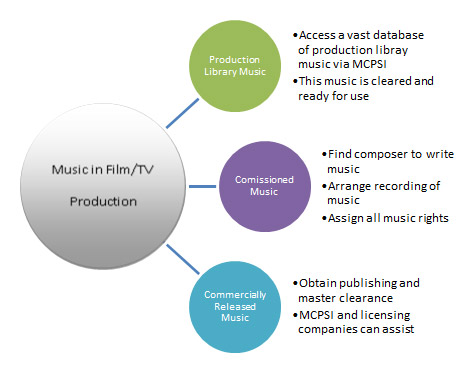 Frank (2014) |
Music plays a vital role in the success of film and television productions. In any given scene, the right music can maximise the tension, fear, anxiety or conversely the joy, excitement or otherwise of the drama unfolding. On the other hand, the wrong music can impose and grate on the viewers senses – distracting from an otherwise compelling performance. Getting the music right of course doesn't just impact on the production and how it is perceived by the audience; a successful score and track placement can garner extra publicity and attention for the production, particularly when it spawns a hit record and the resulting sales of the soundtrack add a significant additional income stream and a myriad of marketing opportunities.
Planning the use of music in a production is vital if the optimal result is to be achieved. The earlier a producer knows which music will work and the budget available to obtain it, the more likely it is that the rights will be successfully obtained in good time. Before embarking on an explanation as to how to go about clearing the use of music in a production, it is important to explore which rights must be cleared for various uses and the varying sources for these clearances. Music Rights The music that we all hear day to day on radio, TV and the internet is generally commercially released music – this can include everything from chart hits to obscure underground music released by small record labels around the world. In every piece of this music the rights are twofold: A. The Composition
B. The Recording This can cause confusion amongst those beginning to grapple with the rights issues. It seems easier to fathom for instance that a set of rights exist in a film script and another set of rights in a film (a performance and recording of the film script) than it is with a piece of written music and the actual performance and recording of it. With music it may help to visualise a piece of sheet music (the composition comprising the musical notes and lyrics) acquiring one set of rights and the subsequent performance and recording of that music acquiring a separate sets of rights. The Blanket Licence and the Composition A composer will usually assign some of his rights to a collection society (IMRO/MCPSI in Ireland*) and very often the remaining rights will be signed to a publisher. IMRO/MCPSI in turn grant blanket licences to broadcasters and production companies for certain limited uses of music. For instance, if an episode of Fair City has a hit song playing in the background in a scene set in the local pub, this will likely be covered by the blanket licence as an incidental use. If however the song was to feature more prominently in the production then the producer or music supervisor may need to approach the composer/ publisher for a specific licence to use the song in the desired manner. Producers should determine whether they are covered by their commissioning broadcasters licence or if they should obtain an Independent Production Company Blanket Licence (IPC) by speaking to MCPSI early in the production process. If it's a one-off production or requires unusual clearances an individual synchronisation licence tailored to the specific use may be more appropriate. The Blanket Licence and the Recording PPI*** provide blanket licences for use of recorded music to broadcasters but not to production companies. A production that has been commissioned by an Irish broadcaster may have some clearances covered by a blanket licence. It is advisable for the producer to communicate with PPI regarding this. If the use falls outside of the blanket licence the individual record label or owner of the master may need to grant a specific licence.
| 





